Today, 51% of U.S. adults say they support the Black Lives Matter movement, a decrease from 56% a year ago. The share who say they strongly support the movement dropped from 26% in 2022 to 22% in the new survey.
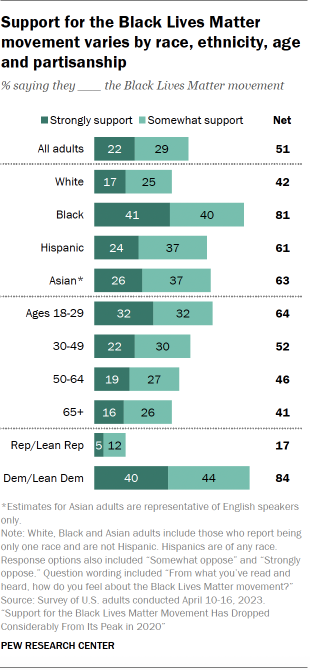
The decrease in overall support is mostly due to the declining share of White adults who say they support the movement. The shares of Black and Hispanic adults who express support have stayed about the same since 2022. (The sample size for Asian adults was too small for separate analysis in 2022.)
Support for the Black Lives Matter movement
As in previous years, support for the Black Lives Matter movement differs along demographic and partisan lines.
About eight-in-ten Black adults (81%) say they support the movement at least somewhat, compared with smaller shares of Hispanic (61%), Asian (63%) and White (42%) adults who say the same.
Adults younger than 30 are more likely than those in all other age groups to support the movement.
More than eight-in-ten Democrats and Democratic leaners (84%) say they support the movement. In turn, 82% of Republicans and GOP leaners oppose it.
Views by race and ethnicity among Republicans and Democrats
Across racial and ethnic groups, Democrats are more likely than their Republican counterparts to say they support the Black Lives Matter movement.
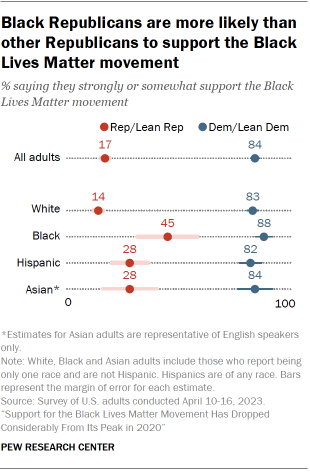
But there are some differences by race and ethnicity within each political party.
Roughly eight-in-ten or more White, Black, Hispanic and Asian Democrats support the movement, but Black Democrats are the most likely to express strong support. Some 47% of Black Democrats say they strongly support the movement, compared with 40% of White, 35% of Asian and 33% of Hispanic Democrats.
In contrast, Black Republicans are more likely than their White, Hispanic and Asian counterparts to support the movement. Some 45% of Black Republicans say they support it, followed by 28% each among Hispanic and Asian Republicans and 14% among White Republicans.
Words that describe the Black Lives Matter movement
A third of Americans say the word dangerous describes the Black Lives Matter movement extremely or very well, and 34% say the same about the word divisive. Smaller shares describe the movement as empowering (26%) and inclusive (18%).
Views by race and ethnicity
White adults are more likely than Black, Hispanic or Asian adults to say the words dangerous and divisive describe the Black Lives Matter movement extremely or very well. Black adults are the least likely racial or ethnic group to say this. In fact, 50% of Black adults say dangerous doesn’t describe the movement too well or at all well.
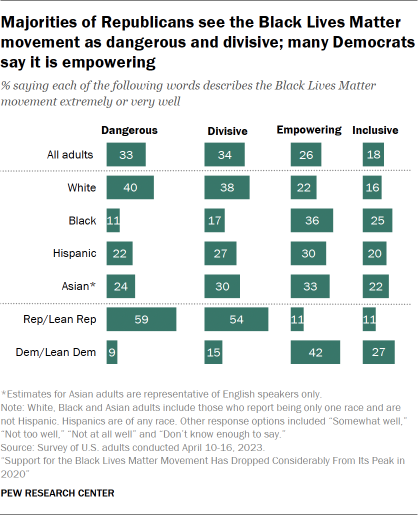
Black, Hispanic and Asian adults are all more likely than White adults to say the word empowering describes the movement extremely or very well. And Black and Asian adults are more likely than White adults to say the same about the word inclusive. In turn, 43% of White adults say inclusive doesn’t describe the movement too well or at all well, a larger share than any other racial or ethnic group.
Views by party
A majority of Republicans say the words dangerous (59%) and divisive (54%) describe the Black Lives Matter movement extremely or very well. Smaller shares of Democrats say the same about each of these words (9% and 15%, respectively).
Democrats are more likely than Republicans to say the words empowering (42% vs. 11%) and inclusive (27% vs. 11%) describe the movement extremely or very well. Majorities of Democrats say these words describe the Black Lives Matter movement at least somewhat well.
How effective has the Black Lives Matter movement been?
About three-in-ten Americans (31%) say they understand the goals of the Black Lives Matter movement extremely or very well. Four-in-ten say they understand the goals somewhat well, while 27% say they don’t understand the goals too well or at all well.
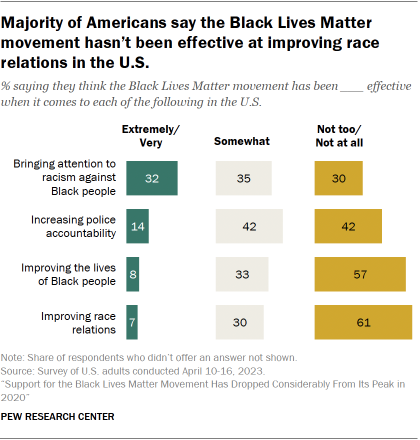
Roughly a third of Americans (32%) say the Black Lives Matter movement has been extremely or very effective at bringing attention to racism against Black people.
Smaller shares say the movement has been highly effective at increasing police accountability (14%), improving the lives of Black people (8%) and improving race relations (7%). In fact, more than half of Americans say the movement hasn’t been too or at all effective in improving the lives of Black people or improving race relations (57% and 61%, respectively).
Views by race and ethnicity
About half of Black adults (48%) and 46% of Asian adults say the movement has been extremely or very effective in bringing attention to racism against Black people in the United States. Smaller shares of Hispanic (33%) and White adults (27%) have this view.
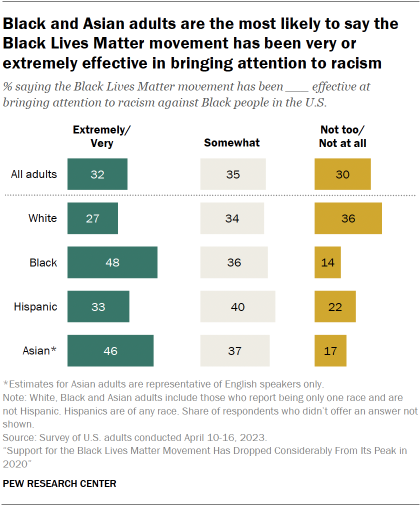
Black, Hispanic and Asian adults are more likely than White adults to say the movement has been highly effective at increasing police accountability, improving the lives of Black people and improving race relations. But only about a quarter or fewer in each racial or ethnic group say the movement has been highly effective in these areas.
White adults are the most likely to say the movement hasn’t been too effective or hasn’t been effective at all when it comes to each of these areas. In fact, most White adults say the movement hasn’t been effective at improving race relations (68%) or improving the lives of Black people (63%). Smaller but sizable shares ranging from 41% to 51% among Black, Hispanic and Asian adults also say the movement hasn’t been effective at improving race relations or the lives of Black people.
Views by party
Half of Democrats say the Black Lives Matter movement has been extremely or very effective at bringing attention to racism against Black people, while 14% of Republicans share this view.
Democrats are also 11 percentage points more likely than Republicans to say the movement has been highly effective at increasing police accountability (20% vs. 9%).
Only about one-in-ten or fewer among both Democrats and Republicans say the movement has been highly effective at improving the lives of Black people or improving race relations in the U.S.


